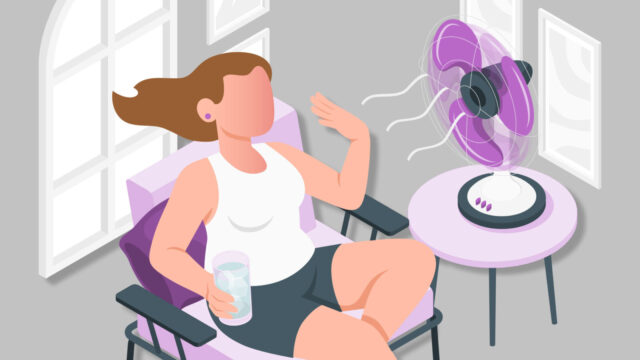
Menopause is a stage in the natural reproductive cycle of a woman’s life that heralds the conclusion of menstrual cycles, officially declared after a full year without periods. While it can manifest anytime in your 40s or 50s, the U.S. average age for menopause is around 51.
This phase is part of your body’s innate journey. However, the tangible physical manifestations like hot flashes and the emotional fluctuations that accompany menopause might disturb sleep, drain energy, or impact emotional well-being.
Thankfully there are accessible menopause treatments, ranging from lifestyle adaptations to hormone therapy, to help foster a smooth transition into this phase of your life.

Understanding menopause
Menopause signifies the final conclusion of a woman’s reproductive phase, marked by the cessation of cyclical menstruation that begins at the start of puberty. The progression toward menopause, termed perimenopause, involves notable shifts in menstrual patterns.
With age, a woman’s ovaries gradually produce fewer hormones, particularly estrogen and progesterone, pivotal in regulating the menstrual cycle.
Amid perimenopause, fluctuations in hormone levels lead to irregular menstrual periods. Cycles might shorten or extend, while flow intensity varies. Periods could be skipped, heavier, or lighter than usual due to dwindling ovarian ability to consistently release mature eggs.
Approaching menopause, declining estrogen levels prompt fewer egg releases from the ovaries. Ultimately, egg production halts, culminating in permanent menstruation cessation. Official menopause diagnosis entails 12 successive months without a menstrual period.
The gradual hormone production decline and resulting menstruation changes serve as hallmark signs of the menopausal transition.
While navigating menstrual fluctuations during perimenopause may pose challenges, they’re inherent to the aging process, signaling the body’s shift from reproductive capacity to a novel life phase.
Menopause signs and symptoms which indicate the need for Menopause Treatment
During the onset of the menopausal phase, diverse signs and symptoms, inclusive of menstruation changes, exhibit variations among women. It’s highly probable that you will encounter fluctuations in your menstrual cycle as you approach menopause.
Periods taking a hiatus during the perimenopausal phase is a common occurrence and perfectly normal. Frequently, menstrual cycles might skip a month before resuming, or they could go dormant for several months before reinitiating monthly patterns for a brief period.
It’s also typical for periods to appear on shorter cycles, resulting in closer intervals between them. Amidst these irregular cycles, it’s important to note that pregnancy remains a possibility.
If you’ve missed a period and are unsure if you’ve commenced the menopausal journey, a pregnancy test could offer clarity.
Some of the most common symptoms for which you might need Menopause Treatment are:

Hot Flashes:
These abrupt surges of heat often come with redness and sweating. Their intensity can vary, disrupting both daily routines and sleep patterns.
Night Sweats:
Nighttime hot flashes can be particularly intense, causing profuse sweating and damp bedding, which in turn affects the quality of sleep.
Vaginal Dryness:
A drop in estrogen levels can lead to vaginal dryness, causing discomfort, painful intercourse, and increased vulnerability to infections.
Mood Swings:
Hormonal fluctuations influence neurotransmitters, contributing to mood swings, irritability, anxiety, and potential bouts of depression.

Fatigue:
Sleep disturbances due to night sweats and other symptoms can result in persistent fatigue and lowered energy levels.
Sleep Disruptions:
Hot flashes and night sweats frequently lead to sleep disruptions, leading to both insomnia and daytime drowsiness.
Weight Gain:
Hormonal changes can impact metabolism, sometimes resulting in weight gain and shifts in body composition.
Decreased Libido:
Diminished estrogen levels can lead to a decreased interest in sexual activity and discomfort during intercourse.

Menopause Treatment to Alleviate Symptoms
Hormone therapy is the primary and most effective treatment for menopause symptoms. It aims to address women’s declining levels of essential reproductive hormones – estrogen, progesterone, and testosterone.
This therapy is tailored to individual needs, mitigating the adverse effects of hormone imbalances during menopause.
The journey toward personalized hormone therapy begins with a thorough evaluation. Our medical experts initiate this process by conducting comprehensive lab tests and analyzing blood panels to gauge your hormone levels.
A comprehensive physical examination is also part of this assessment.
With a clear understanding of your health profile, our team collaborates to craft a bespoke hormone therapy regimen designed to cater to your unique symptoms and requirements.
Alongside this, we provide guidance on lifestyle adjustments that complement the effects of hormone replacement therapy.
Women’s hormone therapy can be administered in various forms, including creams, patches, gels, injections, or subdermal pellets. The selection of the most suitable delivery method is determined in consultation with you, considering your specific symptoms.
Diverging from one-size-fits-all approaches, our menopause treatment plans are meticulously customized to align with your symptoms, aspirations, and way of life.
Results of Menopause Treatment
Although results can vary among individuals, significant enhancements in overall well-being are commonly observed by all patients. Hormone replacement therapy for menopause is executed over several months.
During this period, gradual improvements in your health and overall quality of life unfold, easing menopause symptoms and fostering a greater capacity to relish life’s pleasures.
In terms of physical effects, hormone replacement therapy can alleviate a spectrum of troublesome menopausal symptoms. Frequently, it helps mitigate discomfort from hot flashes, night sweats, and vaginal dryness.
The relief derived from these symptoms often results in enhanced sleep quality and an overall feeling of well-being.
Moreover, hormone therapy may offer advantages to bone health, given estrogen’s pivotal role in sustaining bone density. By addressing hormonal imbalances, this therapy can play a role in diminishing the likelihood of osteoporosis and fractures.
On an emotional level, hormone replacement therapy can yield positive effects on mood swings, irritability, and anxiety, often linked with menopause. Many women express a sense of increased stability and emotional resilience after undergoing hormone therapy.
This equilibrium of emotions can profoundly influence daily life quality, relationships, and overall mental wellness.
Furthermore, hormone therapy has the potential to amplify cognitive function. Certain studies propose that estrogen supplementation could contribute to enhanced memory and cognitive performance for women experiencing menopause.
By nurturing cognitive vitality, hormone therapy may empower women to maintain lively and engaging lifestyles.

Conclusion
To sum up, hormone replacement therapy offers a versatile approach to tackling menopause challenges. It relieves physical symptoms, improves emotional well-being, and potentially enhances cognitive function.
This therapy provides a holistic solution, enabling women to navigate the menopause journey with increased comfort and confidence.









